A sure sign you’re running for President: firing your racist sidekick.
Last summer Kentucky Senator Rand Paul, by “mutual decision,” accepted the resignation of his aide Jack Hunter, AKA the Southern Avenger. Rand is having trouble climbing out of his father’s Libertarian shadow along with all those shadowy white supremacists the Libertarian brand attracts, so Hunter’s views on Southern succession, the Lincoln assassination, and whether “a non-white majority America would simply cease to be America” were declared a “distraction.”
Hunter also retired the Southern Avenger (he reportedly adopted his radio shock jock persona during a conversation with a bottle of Jim Bean), but not before co-writing Paul’s The Tea Party Goes to Washington. Hunter did not co-write the sequel, Government Bullies, which was an even bigger “distraction” because the Senator plagiarized it instead. That would get him expelled from my college, but the White House has different standards.
I teach at Washington & Lee University, in a smallville known as a War-Between-the-States tourist Mecca, so I’m familiar with all brands of Southern Avengers. The remains of not one but two Confederate generals rest within a half-mile stroll of my front door. Confederate flags are common—though, unlike Mr. Hunter, most folks don’t sport them on superhero-style masks. Even Captain Confederacy (a creation of comic book writer and former Minnesota gubernatorial candidate Will Shetterly) retired his mask when his series moved to Marvel’s Epic back in 1991. The comic was set in an alternate universe in which the Confederacy won the Civil War (apparently the same universe Newt Gingrich visited for his 2005 Gettysburg novel). After Shetterly retired his first Captain, he has a black woman take over the identity, draping Old Dixie across her breasts.
If that sounds implausible, then you didn’t attend my town’s council meeting in which Southern Avengers protested the banning of Confederate flags from city flagpoles. I can’t criticize since I used to wear the same image across the back of concert t-shirts, believing it represented nothing more than a subgenre of rock. I was sixteen and still preferred Lynyrd Skynyrd’s Gimme Back My Bullets over R.E.M.’s Fables of the Reconstruction.
Civil War reenactors, another common spectacle in Lexington, VA, attended the council meeting too. W&L borders the Virginia Military Institute where I watched a legion of gray-clad and hoop-skirted extras cheer a regal Stonewall Jackson while shooting a scene for the 2003 Gods and Generals. W&L declined the film company’s request to shoot on our campus. For Somersby, crews shoveled the historic downtown streets with dirt and angled the Exxon station out of shots. I’ll watch Jodie Foster in anything, but I like Somersby for its time period. Reconstruction is way more interesting than the Civil War.
Marvel movie guru Joss Whedon agrees. He started writing his TV series Firefly after reading Michael Shaara’s The Killer Angels. Whedon also took an undergraduate class from Richard Slotkin, author of Gunfighter Nation, a seminal study in American frontier mythology. Whedon sets his dystopic future six years after a Civil War with a dispossessed Confederate soldier (he sings “We shall rise again” in the premiere) for a space captain. “Mal’s politics,” says Whedon, “are very reactionary and ‘Big government is bad’ and ‘Don’t interfere with my life,’” attitudes Senator Rand and his former sidekick sing about too. But unlike the Tea Party, Whedon sees both sides: “sometimes he’s wrong—because sometimes the Alliance is America, this beautiful shining light of democracy. But sometimes the Alliance is America in Vietnam: we have a lot of petty politics, we are way out of our league and we have no right to control these people. And yet! Sometimes the Alliance is America in Nazi Germany. And Mal can’t see that, because he was a Vietnamese.”
Actually Mal is the very Caucasian Nathan Fillion, but his second in command, like the second Captain Confederacy and at least one of the flag-wearing protesters at the Lexington council meeting, is an African American woman (AKA, Gina Torres). Whedon’s Confederacy never had slavery. Which is why his take on the Reconstruction is both watchable and a complete cop-out. In some ways, I prefer Edgar Rice Burroughs’ dispossessed Confederate soldier, John Carter. He heads West to dig gold and fight Injuns but ends up on Mars instead—where, surprise surprise, he gains superpowers and champions a ruined race of aristocrats against four-armed apes and green heathens. The Princess of Mars gave me allegorical whiplash, but at least Burroughs’ politics aren’t hard to decode. The South is dead, long live the South.
John Carter and Mal Reynolds are both Reconstruction-fueled space cowboys, which makes them descendants of the real life Southern avenger Jesse James. During the war, James fought as a Missouri bushwhacker against local Union militias. After Richmond fell and General Lee surrendered, the pardoned general-in-chief served as president of my university. Jesse James kept fighting. He saw his campaign of train and bank robberies as resistance to Republican-led Reconstruction. After his murder in 1882, dime novelist converted him into a gunslinging Robin Hood. Like the more recent Southern Avenger, James was also a political columnist. Jack Hunter wrote for the Charleston City Paper, where his articles remain online because his editor refused his request to remove them. James wrote his diatribes for the Kansas City Times, where the owner was a fellow vet working to restore ousted successionists to office.
Missouri elected Democrat Senator Francis Cockrell in 1875, who went on to serve five terms before retiring. To the best of my knowledge, Jesse James was never his aide nor helped him plagiarize any books, but the senator was evidence that the Radical Republicans (their term) had lost control of Reconstruction. The era formerly ended in 1877 when President Hayes withdrew the last federal troops. Their departure also marks the end of the South’s most famous team of masked avengers, the Ku Klux Klan. They’d started as a social club of Confederate vets in Pulaski, Tennessee, but grew into paramilitary groups that openly murdered opponents and police.
Like the X-Men, the Klan also wore identical costumes while led by a man codenamed “Cyclops.” The X-Men attract an impressive range of southern mutants, including Rogue, Gambit, Cannonball and the Blob. Technically DC’s Swamp Thing is a Southerner too, since he crawled out of a Louisiana swamp, but he and his superhero kin are no Southern Avengers. Superman first battled the Klan on the radio 1946, and he’s been followed by the Defenders, Black Panther, Batman, and both the Justice League and the Justice Society.
Hell, even the Southern Avenger hates racists now. Hunter blames all those old slurs of his on that pesky mask: “Whenever I put on that wrestling mask, I took on a persona that was intentionally outrageous and provocative. I said many terrible things. I disavow them.” The unmasked Hunter now criticizes fellow Republicans who dismiss “the idea that racism is actually a problem. I used not to see it. For that, I am very sorry.”
That’s more of an apology than the Confederacy ever offered its African American population. I wouldn’t call it superheroic, but if the Southern Avenger can transform himself, maybe there’s hope for the rest of our disunited States too.
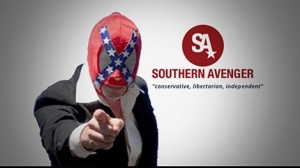
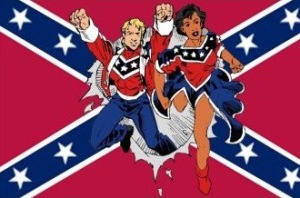
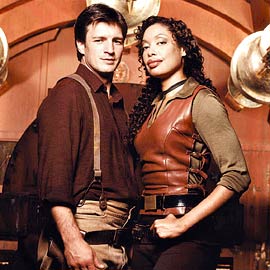
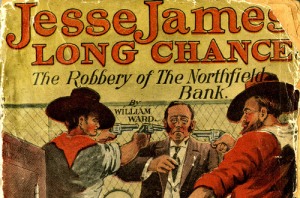
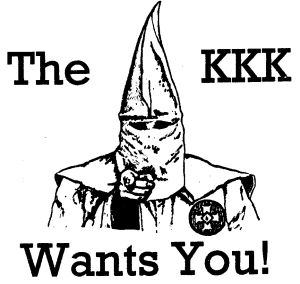
Great piece, Chris! And well timed — I’m working on a conference paper for next month on Captain Confederacy, an alternate-history tale that goes suspiciously light on the history in order to better keep its focus on the supposedly transformative power of colorblindness and individual anti-racism. The reading of Firefly perfectly articulates everything that bugs me about that show.
Have you read Robert Stapp’s A MORE PEREFECT UNION or David Poyer’s THE SHILOH PROJECT? Both alternate histories set in a future where the Cold War is between a twentieth-century USA and CSA. Neither book can resist trying to extract some essence of positive, progressive Confederate heroism from history, though Poyer’s is more sophisticated in his handling of it.
I will also take this opportunity to plug Jack Butler’s JUJITSU FOR CHRIST, by far the best novel about superheroes and the South (and John Carter of Mars and the Civil Rights movement and homoerotic Klan rallies . . . ) I’d love to hear what you make of it.
Oh yes — incidentally, if you prowl around on Confederate nationalist online forums, many of them were super-excited about the recent Disney JOHN CARTER movie, and some are convinced that its depiction of the title character as a noble Confederate warrior is why it was critically panned by the liberal media.
Do you think Hunter was really sorry about his racist rants and comments, or was he just trying to ease political perceptions for his buddy Rand Paul?
Excellent piece, BTW.
I don’t understand how Firefly can be a cop-out as a take on reconstruction when it isn’t a take a reconstruction. I agree that its borrowing of confederate symbols without thinking through what those symbols are attached to is troubling, but much of that is inherited from the Westerns it is so clearly indebted to.
I made the mistake of sharing my postcolonial analysis of the John Carter film on a John Carter fan page. Wow did that not go over well. Burroughs was also a major advocate of eugenics. Which is not to say I don’t enjoy his writing. Firefly, despite its sizeable flaws, is one of my all-time TV favorites too. The Stapp, Poyer and Butler novels (I just read a summary and reviews at Amazon) are all now additions to my need-to-read stack. Thanks, Brannon.
Christian, I read Hunter’s apology essay and I was actually convinced that his recanting was genuine. Obviously Paul must have been leaning on him pretty hard too, but he at least performed what looked like a change of attitude.
Your comment confused me, Isaac. Whedon wrote Firefly in response to The Killer Angels, a historical novel about Gettysburg. The battle of Serenity is the battle of Gettysburg. Mal isn’t simply a generic space cowboy; he’s a veteran of an army that lost its war of succession, and now he’s an outlaw smuggler operating along the frontier of that union during the aftermath of that war. I’m not sure how that can be viewed as not a take on Reconstruction.
I’m not saying it has nothing to do with reconstruction, just to be clear, just that it’s not a portrait of it. Amongst other things, it is much more obviously interacting with the iconography of the American Frontier (and its Mythos). If you simply mean by Reconstruction “Everything that happened between the end of the Civil War and the end of the 19th century” then we probably agree.
But I also would say that, beyond how Mal talks about it (which again mimics how people talk about the expanding government in westerns), there’s not that much evidence that the Alliance is the Union, in part because we actually don’t know very much about it in the handful of episodes and one movie that we have. There’s even less evidence (again within the text itself) that Serentiy is Gettysburg. We know very little about the battle. We know nothing about the substance of the war.
Whedon saying he read a book that inspired him to do the show doesn’t mean that everything that flows from that inspiration moment is entirely about the same things the book is about. Also, what happened to the Intentional Fallacy?
Isaac, perhaps I’m a little guilty of overplaying the role of reconstruction in Firefly and you’re a little guilty of underplaying it. Let’s meet somewhere in the middle.
ONLY TOTAL AGREEMENT WILL SUFFICE. PISTOLS AT DAWN?!?
(Also my grandfather went to W&L, I’ve been there a couple of times… does their a cappella group still sing “Dixie” at concerts?)
I am envious of your ability to bring things together Chris. Great work.
And like you, my love of Firefly has long been tempered by troubling allusions – but then again, I can probably say that about all forms of pop culture I enjoy.
Dixie! That’s hilarious. I’m going to guess that the a cappella group has cut that one from the rep, but maybe that’s just my wishful thinking.
And thank you, Osvaldo. And if pop culture wasn’t so troubling, none of us would be having as much fun as we are critiquing it.
So…Will Shetterly is the same guy who is now a somewhat infamous internet troll, right?
I heard an a cappella group sing Dixie there at a dinner in 1997. I sure hope things have changed.
Must be the same guy. Runs around explaining how race doesn’t matter, it’s all about class and so forth. Lovely.
Yep, that’s me, except Coffeeandink took quotes out of context. I’m also the guy who wrote Dogland, which NPR’s Ellen Kushner called, “A masterwork. A particularly American magic realism that touches the heart of race and childhood in our country; it’s 100 Years of Solitude for an entire generation of American Baby Boomers, and deserves the widest possible audience.” The feministsf wiki said my “work features strong women characters and people of color”. I have never said race doesn’t matter, and the fact Coffeeandink doesn’t quote me saying anything to that effect should be significant. What I have said is that class matters more than race in the modern US, and anyone who thinks Herman Cain’s daughter is oppressed and a homeless white guy is privileged really needs to rethink their understanding of privilege and oppression. Really, criticizing Critical Race Theory is not the same as endorsing racism, denying racism, or thinking that racism is over.
If you’re interested in a more nuanced take on these things, I recommend googling Adolph Reed Jr.’s “The limits of anti-racism” and the Rev. Thandeka’s “Why Anti-Racism Will Fail”.
Hey Will. I am startled at your appearance, but appreciate your gracious response. Thanks for stopping by.
Okay…so, Will, I’m sorry about this, but I’m somewhat familiar with your actions online, and I’m afraid I’m not comfortable having you as part of this community. I’ve blocked you, and I’d appreciate you not commenting here again.
Again, I do appreciate your civility, and since I brought your name up it was reasonable for you to respond. Since I’m asking you not to post here, I will avoid discussing you in the future.
Along those lines, I’d ask folks not to respond to Will’s post, since he’s not going to be here to reply to it.
Thanks everyone.
That may be the sweetest bit of preemptive censorship I’ve ever read, Noah.